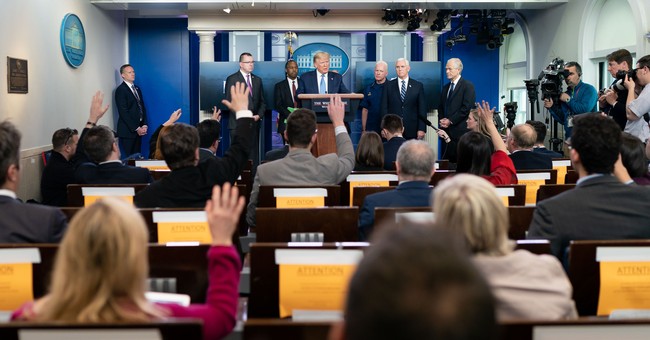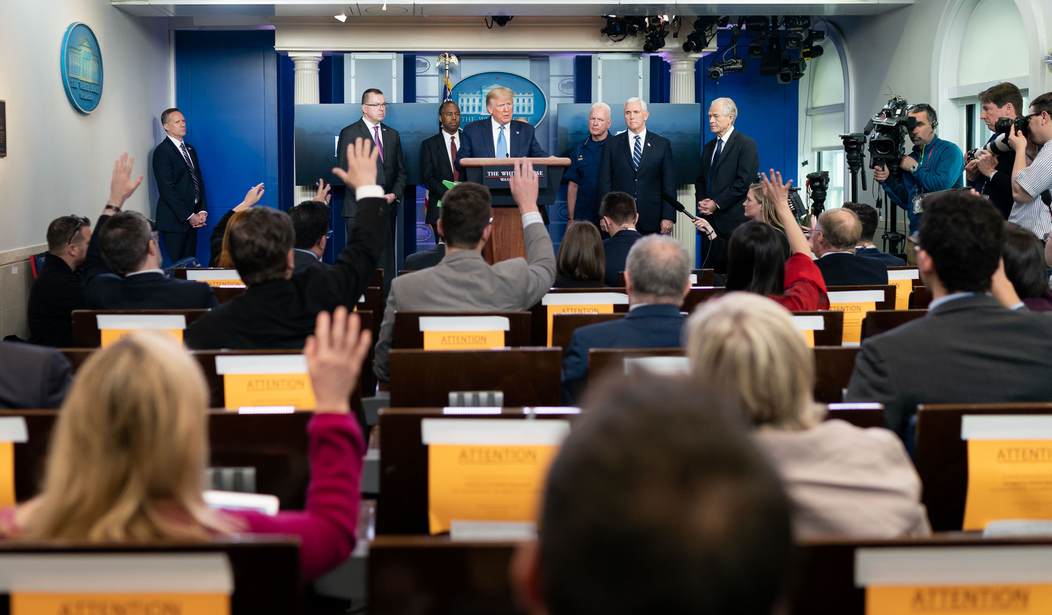
President Donald J. Trump, joined by members of the White House Coronavirus Task Force, takes questions from reporters during a coronavirus update briefing Saturday, March 21, 2020, in the James S. Brady Press Briefing Room of the White House. (Official White House Photo by Tia Dufour)
Of the many good television shows that came out of the 1990s, few were as awesome as Powerpuff Girls on Cartoon Network. It was incredibly funny, featured stellar stories, and included some fantastic villains like a transsexual Satan and a pink hillbilly sasquatch. However, one of the most real villains was Princess Morbucks.
Princess was a character who wanted to be just like the Powerpuff Girls, but she didn’t have any powers. Instead, this spoiled kid used her father’s wealth, her privilege, and manipulative language to get what she wanted, and tried to make everyone believe she could be a hero. Unfortunately, her jealousy of the Powerpuff Girls was simply too much and she chose the wrong path every single time.
Powerpuff Girls debuted in 1998. In 2016, Donald J. Trump was elected President of the United States. Since the moment Trump became the nominee of the GOP, the national media has wanted so desperately to be the hero that they have stood athwart him time after time, and when he became President, they turned this mentality up to overdrive.
Across the country, local media outlets are struggling. Gannett has announced that workers who make over a certain income will be furloughed one week per month from April to June. Other newspapers, TV stations, radio stations, and the like have struggled and have had to make cuts. Major media outlets, the ones with nationwide coverage – particularly legacy media and cable news – don’t really see these cuts. I’d be inclined to call local journalists heroes, because I think many of them do way more important work than a lot of the so-called journalists in the national media do.
Most importantly, though, most of these local journalists don’t try to pretend they’re heroes. They exist to inform their community and hold local government – the government that will most impact their lives – accountable. They tell you the good and the bad in local education. They are the first ones to report on local crime stories big or small.
National reporters don’t have to do that, but they believe that because their platform is bigger, their sources are more important, and their subject (or, in many cases, their target) is so much more important, that they are the heroes. And they are taking it really personally when Trump treats them like they aren’t.
Take CNN’s Chris Cillizza. An analyst for CNN, Cillizza publishes the most basic, easy-to-come-by analysis that it boggles the mind that he would be paid six (or more???) figures a year for it. Yesterday, he decided to show the world that he believes journalists like him are heroes.
I am now a proud owner of this sweatshirt
cc:@RAYGUNshirts pic.twitter.com/0K7ZBrXrup
— Chris Cillizza (@CillizzaCNN) March 31, 2020
This is the equivalent of Princess Morbucks begging to be considered a hero like the Powerpuff Girls. He provides no journalistic value to the world, but he believes that because he has a cushy gig with CNN and gets paid the big bucks for it, he is entitled to be considered one. But he isn’t.
Neither are the journalists who take the opportunity to be combative at press conferences. It’s one thing to ask a tough question, but it’s another to approach Trump or any administration official with outright hostility and think “Ah yes this is a good job I’m doing.” That doesn’t make them heroes. It makes them distractions. Journalism isn’t about being openly confrontational – and borderline belligerent – with politicians they don’t like. Journalism is about digging, doing the hard work, to find the information.
The best journalism is never done publicly. It is never done with a big announcement laying out what you’re doing ahead of time. Just like the best real-world heroes aren’t the ones who go out there and act like they are heroes, but instead work quietly just doing their job, journalism is about the legwork, not the optics.
In 2016, when Trump won, I wrote the following about the national media:
This is why local journalism actually stands a chance of out-living national media. They are dealing with economic struggles just as much, if not more than, the national outlets. But, people tune into them and read them because they actually get out into the community and talk to people. National outlets don’t do that on the level they should. A firm runs a poll that says 54% of Americans feel X. Okay, there’s your story. Maybe find someone on Twitter or on the street that represents that result and get a quote. Find one person who holds the opposite view. Get their quote. Story done.
When it did happen, when a national outlet found someone who supported the contrarian view (i.e. a Trump supporter), did they take what the “man on the street” said seriously? No. They treated him (or her!) like a novelty. Like “This is adorable. You actually support Trump.” was a good way of handling that situation.
They are perceived (perhaps rightly so) as contemptuous of the average American. If you are not someone who lives on the Obviously Superior East or West Coast, your opinion really isn’t worth studying. That matters in an election when the rejection of Washington D.C.’s elitism is the undercurrent of an election.
This sense of entitlement, this belief that “We’re the heroes of our stories!” is one of the things normal, average Americans can’t identify with. And it’s translating into low trust from the general public. The media polls worse than Donald Trump when it comes to who people trust, and what makes it even worse is that the real heroes of journalism – the ones who do the legwork, the digging, put in the hours to write the masterpieces that really affect change – suffer for it.
Journalists are not heroes. Maybe they aren’t straight-up villains like Princess Morbucks of Powerpuff Girls, but they are definitely not the heroes in all this. They are, at best, a distraction. A small ripple in an ocean. They should act better than this, but they won’t. And that’s just pathetic.













Join the conversation as a VIP Member